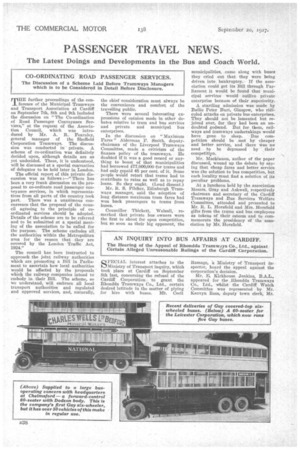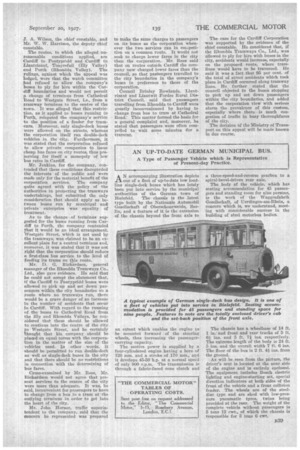AN INQUIRY INTO BUS AFFAIRS AT CARDIFF.
Page 56

Page 57

If you've noticed an error in this article please click here to report it so we can fix it.
The Hearing of the Appeal of Rhondda Tramways Co., Ltd., against Certain Alleged Unreasonable Rulings of the Cardiff Corporation.
SPECIAL interest attaches to the Ministry of Transport inquiry, which took place at Cardiff on September 8th lnst, concerning the refusal of the Cardiff Corporation to grant the Rhondda Tramways Co., Ltd., certain desired latitude in the matter of plying for hire with buses. Mi.. Cecil
Ramage, n Ministry of Transport inspector, heard the appeal against the corporation's decision.
Mr. E.' Kirkhouse Jenkins, B.A.L., appeared for the Rhondda Tramways Co., Ltd., whilst the Cardiff Watch Committee was represented by Mr. Kenvyn Rees, deputy town clerk, Mr. J. A. Wilson, the chief constable, and Mr. W. W. Harrison, the deputy chief constable.
The routes, to which the alleged unreasonable conditions applied, are Cardiff to Pontypridd and Cardiff to Llantrisant, Tonyrefail (Ely Valley) and Porth (Rhondda Valley). The rulings, against which the appeal was lodged, were that the watch committee bad refused to allow the company's buses to ply for hire within the Cardiff boundaries and would not permit a change of terminus from Cathedral Road to Westgate Street, i.e., from a tramway terminus to the centre of the town. It was alleged that this restriction, as it applied to buses sunning to Porth, relegated the company's service to the position of a feeder for tramcars. Moreover, only single-deck buses were allowed on the streets, whereas the corporation itself ran double-deck vehicles in the city. Furthermore, it
as stated that the corporation refused to allow private companies to issue :cheap bus fares on city routes, thus preerving for itself a monopoly of low bus rates in Cardiff.
Mr. Jenkins, for the company, contended that these conditions disregarded the interests of the public and were made only for the material benefit of the corporation services. The company quite agreed with the policy of the authorities in protecting the tramways undertakings, but submitted the only consideration that should apply as between buses run by municipal and private enterprise was equality of treatment.
As to the change of terminus suggested for the buses running from Cardiff to Porth, the company contended that it would be an ideal arrangement. Westgate Street, which is not used by the tramways, was claimed to be an excellent place for a central terminus and, moreover, it was stated that it was not right that the corporation should reduce a first-class bus service to the level of feeding its trams on this route.
Mr. D. G. Richardson, general manager of the Rhondda Tramways Co., Ltd., also gave evidence. Ile said that be could not accept the statement that, !if the Cardiff to Pontypridd buses were allowed to pick up and set down passengers within the city boundaries on a route where no tramways run, there would be a grave danger of an increase in the number of accidents that occur ln Cardiff. With regard to the running of the buses to Cathedral Read from the Ely and Rhondda Valleys, he considered that these should be allowed to continue into the centre of the city to Westgate Street, and he certainly thought that his company should be placed on equal terms with the corporation in the matter of the size of the vehicles used. In other words, it should be permitted to run double-deck as well as single-deck buses in the city and that there should be no restrictions in connection with the determining of bus fares.
Cross-examined by Mr. Rees, Mr. Richardson would not agree that present services to the centre of the city were more than adequate. It was, he said, inconvenient for passengers to have to change from a bus to a tram at the outlying terminus in order to get into the heart of the city. Mr. John Horner, traffic superintendent to the company, said that the concern he represented was prepared
to make the same charges to passengers on its buses as the corporation whenever the two services ran in cm:petition on a common route. It would not seek to charge lower fares in the city than the corporation. Mr. Rees said that on routes outside Cardiff the company now charged lower fares than the council, so that passengers travelled to the city boundaries in the company's buses in preference to those of the corporation.
Council Brinley Rowlands, Llantrisant and Llantwit •Fordre Rural District Council, said that passengers travelling from Rhondda to Cardiff were greatly inconvenienced by having to change from bus to tram at Cathedral Road: This matter formed the basis for a general complaint and, moreover, he stated that passengers were often compelled to wait some minutes or a tramcar. The case for the Cardiff Corporation was supported by the evidence of the chief constable. He considered that, if the Rhondda Tramways Co., Ltd., was allowed to ply for hire with buses in the city, accidents would increase, especially on the proposed route, where tramlines would have to be traversed. He said it was a fact -that 95 per cent. of the total of street accidents which took place in Cardiff occurred along tramway lines. He further stated that the council objected to the buses stopping to pick up and set down passengers within the city boundaries, and added that the corporation view with serious alarm the prevalence of this custom, especially where there is much congestion of traffic in busy thoroughfares of the city. The decision of the Ministry of Transport on this appeal will be made known In due course.




































































































